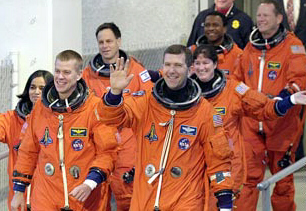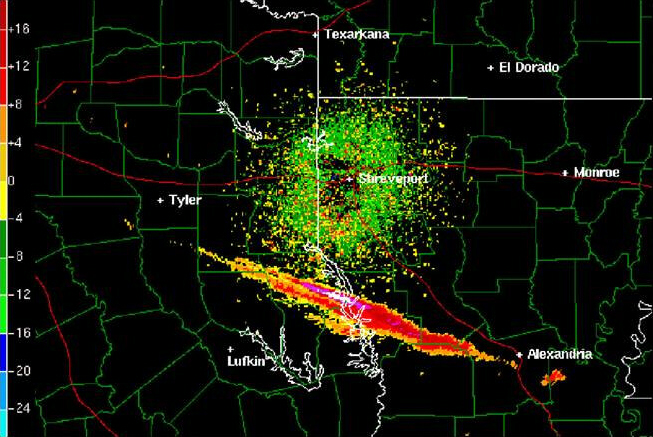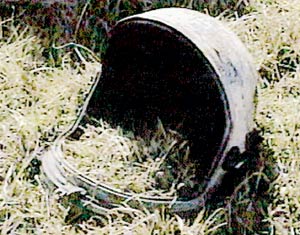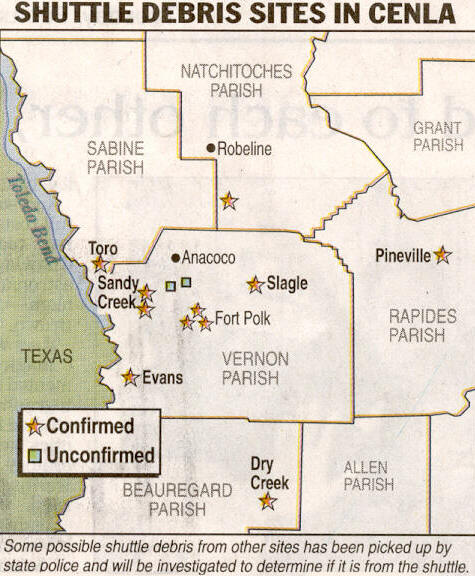
Columbia Shuttle Flight
The Crew
Commander Rick Husband is at
center.
Behind him in the front row from left are
Kalpana Chawla and William McCool;
second row from left are Israeli astronaut Ilan Ramon and Laurel Clark;
and third row from left are Michael Anderson and David Brown.
The senior pastor of Grace Community
Church in Houston, Steve Riggle, described shuttle commander Rick Husband and
payload commander Mike Anderson on Sunday as born-again believers who “fervently
lived for God.” Riggle also shared that Husband’s last wish was that his
pastor tell people about Jesus because “He means everything to me.”
Riggle told members of his church that Husband wrote those instructions on the
sheet that all astronauts fill out before going into space.
Executive pastor Garrett Booth says his church will remember more than just their sense of duty and patriotism. “Both men were men of integrity — great fathers and family men,” Booth says. “And they both had a deep faith in Jesus Christ that went beyond their successes and their work. It was really the foundation for their lives — and they will be deeply missed.”
Lift-off, Thursday morning, January 16, 2003
Disaster
Saturday morning, February 1st,
2003
8:00 o'clock
Sequence of Events, Central Standard Time
7:15 a.m. Columbia fires braking rockets.
7:53 a.m. Ground controllers lose hydraulic temperature data. Shuttle crew is not alerted.
7:56 a.m. Sensors show rise in temperature, pressure on shuttle's left-side landing gear.
7:58 a.m. Data is lost from three temperature sensors in shuttle's left wing.
7:59 a.m. Data is lost from left-side tire temperature, pressure sensors. Crew is alerted.
Approximately 8:00 a.m. All vehicle data is lost. Shuttle is 207,135 feet up, traveling about Mach 18.3 Noise, lights in sky reported over Texas, Louisiana.
8:16 a.m. NASA contacts President Bush, Homeland Security Director Tom Ridge.
Radar image in orange and red, showing the path of the vapors and particles from the break-up of the Columbia Space Shuttle, southeast of Tyler, Texas to just below Alexandria, Louisiana.

A debris trail spread across Texas and Louisiana with 13 confirmed pieces of the wreckage being found in Louisiana (as of February 2, 2003) -- as far north as Shreveport and as far east as Pineville, just northeast of Alexandria.

This helmet was found roughly fifty miles to the west of us.

This graphic appeared in our local newspaper, The Alexandria Daily Town Talk, on February 4, 2003. We live roughly halfway on an imaginary line drawn between Slagle and Pineville, within Rapides Parish, several miles east of Vernon Parish.
Where was God
when these seven heroic people were blown
apart? What does the Bible tell us
about the hand of God in history? Do these disasters simply happen, and God has
nothing to do with them? Is he limited in the exercise of his power? Is history
ultimately meaningless with no connection between how we live and what happens
to us? Do we serve an impotent God?
Many people believe that God,
for one reason or another, either does not or cannot intervene in real time and
space, or that his power is off-set by the decisions of men and devils.
The Prophet Amos asked: “When disaster comes to a city, has not the
LORD caused it?” (Amos 3:6.)
In the ancient world of
Persia, the followers of Zoroaster were profoundly dualistic. Zoroaster “apprehended
Ahura Mazda as God, the one eternal, uncreated Being, wholly good, wise, and
beneficent; but coexisting with him he saw another Being, the Evil Spirit, Angra
Mainyu (Pahlavi Ahrimanc), who was wholly evil, ignorant, and malign, likewise
uncreated, but doomed in the end to perish.” [Freedman, David Noel, ed., The
Anchor Bible Dictionary, (New York: Doubleday), 1992.] (Sounds a bit like
Obi-Wan Kenobi’s instructions to Luke Skywalker about the Force with its dark
and light sides.)
God rebuts this Zoroastrian
dualism to the Persian Emperor Cyrus in Isaiah 45. Note especially verses 6 and
7: “I am the LORD, and there is no other. I form the light and create
darkness, I bring prosperity and create disaster; I, the LORD, do all these
things.” All things that happen are the unfolding of God’s divine purpose,
both weal and woe.
Without addressing all of the
many questions about the relationship of God’s sovereignty to such things as
humans as free moral agents, natural phenomena, or the real power of Satan, who
undoubtedly has a hand in human tragedy, we have to affirm that the terrible
event of the Columbia Shuttle disaster did not happen outside of the sphere of
God’s sovereignty.
Yet having affirmed that, we
must immediately affirm the enigma of history: “Then I saw all that God has
done. No one can comprehend what goes on under the sun. Despite all his efforts
to search it out, man cannot discover its meaning. Even if a wise man claims he
knows, he cannot really comprehend it.” (Ecclesiastes 8:17.)
We know that God is working in history, but figuring out how that happens or what are his penultimate purposes is beyond our ability. Ecclesiastes keeps us from glib commentaries on these disasters, especially when they are done with an attitude of self-righteousness.
A Reuters’ headline on the day of the disaster read: “Iraqis Call Shuttle Disaster God’s Vengeance.” Part of this reaction was because “Israeli air force Colonel Ilan Ramon was among the dead when the shuttle broke up over the southwestern United States 16 minutes before its scheduled landing. The 48-year-old Israeli astronaut was a fighter pilot in the Israeli air force. He was the youngest pilot in a team that bombed Iraq’s nuclear reactor in 1981.”
Islamist cleric Abu Hamza ‘called the Columbia crew “thugs of space” who deserved to die. He denounced the team — made up of Americans, an Israeli and an Indian-born Hindu — as a “trinity of evil” punished by Allah. The 45-year-old cleric said they were “criminals” bent on boosting military satellite technology so America could dominate the world. He claimed it was a sign from God that debris rained down on a Texas town named Palestine.’
However, the Lord Jesus warns
us against pointing fingers at others when we see these kinds of tragedies:
‘Now there were some
present at that time who told Jesus about the Galileans whose blood Pilate had
mixed with their sacrifices. Jesus answered, “Do you think that these
Galileans were worse sinners than all the other Galileans because they suffered
this way? I tell you, no! But unless you repent, you too will all perish. Or
those eighteen who died when the tower in Siloam fell on them — do you think
they were more guilty than all the others living in Jerusalem? I tell you, no!
But unless you repent, you too will all perish.”’ (Luke 13:1-5.)
By Jesus’ response to those
who informed him of these deaths, it is obvious that they had raised the issue
of God’s judgment. These folk
thought that disasters, whether natural or caused by humans, are simply the hand
of God punishing people for their sins.
But Jesus’ words about
Pilate’s state sponsored terrorism and the “natural” disaster of the
collapse of the tower in Siloam cut the ground out from under us when we are
tempted self-righteously to point fingers at others, because he tells us that
all these terrible things should remind us of the future judgment of God and be
a signpost to be ready for it. There is coming a time when fire will fall from
heaven, not on parts of two states but all over this world.
The Preacher in James Weldon
Johnson’s God’s Trombones asks: “Sinner, oh, sinner, Where
will you stand, in that great day when God’s a-going to rain down fire?”
As with September 11, 2001, February 1, 2003 is not a time for finger pointing; it is a time for kneeling before a sovereign God, especially as America is poised on the brink of war with Iraq. This is a time for the people of both countries to seek the face of God in repentance. The Columbia’s destruction reminds us that technology can often fail at the worst possible time. The Psalmist wrote: “Some trust in chariots and some in horses, but we trust in the name of the LORD our God.” (Psalm 20:7.)
Our military superiority can
fail. Our sovereign God never has.
Our trust must be in him, and we must turn from our sins to him.
Now is not a time for self-righteous pride; it is a time for
self-examination, for many Americans may fare no better on the Day of Judgment
than many Iraqis and even Saddam Hussein himself.
As a signpost of that
Dreadful Day, the Columbia disaster warns me that I am “Standing in the need
of prayer.”
“Not my brother, not my sister,
But it’s me, O Lord
Standing in the need of prayer.”
“Not my neighbor, not a
stranger, But it’s me, O Lord
Standing in the need of prayer.”
This fire from the sky is a divine summons to bring each of us in the brokenness of repentance to the foot of the cross. And there is no more secure place in the entire world than that. It is to those who turn from their sins and self-righteousness, that Jesus speaks words of security and comfort: “Do not be afraid of those who kill the body but cannot kill the soul. Rather, be afraid of the One who can destroy both soul and body in hell. Are not two sparrows sold for a penny? Yet not one of them will fall to the ground apart from the will of your Father. And even the very hairs of your head are all numbered. So don’t be afraid; you are worth more than many sparrows.” (Matthew 10:28-31.)
The Bible instructs us that
for the believer, death is never a tragedy: “For to me, to live is
Christ and to die is gain . . . I desire to depart and be with Christ, which is
better by far.” (Philippians 1:21.) We know that shuttle commander Rick
Husband and payload commander Mike Anderson are with the Lord Jesus and are
supremely happy; we can entrust the rest of the crew into the hands of a God who
is not only altogether just but altogether merciful. Our prayers should be with
the families of those who have died.
Furthermore, Scripture
affirms that history does have an ultimate purpose and that God directs all that
happens for the ultimate good of those who love him.
“We know that all things
work together for good to those who love God, to those who are the called
according to his purpose. For whom
he did foreknow, he also predestined to be conformed to the image of his Son,
that he might be the firstborn among many brethren.” (Romans 8:28, 29.)
Bob
Vincent
80 Hickory Hill Drive
Boyce, Louisiana 71409
On Cotile Lake.